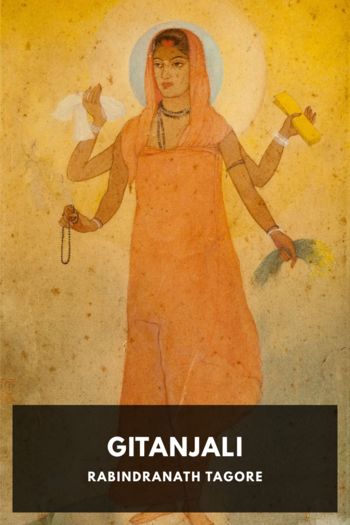My Reminiscences, Rabindranath Tagore [famous ebook reader .TXT] 📗

- Author: Rabindranath Tagore
Book online «My Reminiscences, Rabindranath Tagore [famous ebook reader .TXT] 📗». Author Rabindranath Tagore
On leaving the Normal School we were sent to the Bengal Academy, a Eurasian institution. We felt we had gained an access of dignity, that we had grown up—at least into the first storey of freedom. In point of fact the only progress we made in that academy was towards freedom. What we were taught there we never understood, nor did we make any attempt to learn, nor did it seem to make any difference to anybody that we did not. The boys here were annoying but not disgusting—which was a great comfort. They wrote ass on their palms and slapped it on to our backs with a cordial “hello!” They gave us a dig in the ribs from behind and looked innocently another way. They dabbed banana pulp on our heads and made away unperceived. Nevertheless it was like coming out of slime on to rock—we were worried but not soiled.
This school had one great advantage for me. No one there cherished the forlorn hope that boys of our sort could make any advance in learning. It was a petty institution with an insufficient income, so that we had one supreme merit in the eyes of its authorities—we paid our fees regularly. This prevented even the Latin Grammar from proving a stumbling block, and the most egregious of blunders left our backs unscathed. Pity for us had nothing to do with it—the school authorities had spoken to the teachers!
Still, harmless though it was, after all it was a school. The rooms were cruelly dismal with their walls on guard like policemen. The house was more like a pigeonholed box than a human habitation. No decoration, no pictures, not a touch of colour, not an attempt to attract the boyish heart. The fact that likes and dislikes form a large part of the child mind was completely ignored. Naturally our whole being was depressed as we stepped through its doorway into the narrow quadrangle—and playing truant became chronic with us.
In this we found an accomplice. My elder brothers had a Persian tutor. We used to call him Munshi. He was of middle age and all skin and bone, as though dark parchment had been stretched over his skeleton without any filling of flesh and blood. He probably knew Persian well, his knowledge of English was quite fair, but in neither of these directions lay his ambition. His belief was that his proficiency in singlestick was matched only by his skill in song. He would stand in the sun in the middle of our courtyard and go through a wonderful series of antics with a staff—his own shadow being his antagonist. I need hardly add that his shadow never got the better of him and when at the end he gave a great big shout and whacked it on the head with a victorious smile, it lay submissively prone at his feet. His singing, nasal and out of tune, sounded like a gruesome mixture of groaning and moaning coming from some ghost-world. Our singing master Vishnu would sometimes chaff him: “Look here, Munshi, you’ll be taking the bread out of our mouths at this rate!” To which his only reply would be a disdainful smile.
This shows that the Munshi was amenable to soft words; and in fact, whenever we wanted we could persuade him to write to the school authorities to excuse us from attendance. The school authorities took no pains to scrutinise these letters, they knew it would be all the same whether we attended or not, so far as educational results were concerned.
I have now a school of my own in which the boys are up to all kinds of mischief, for boys will be mischievous—and schoolmasters unforgiving. When any of us are beset with undue uneasiness at their conduct and are stirred into a resolution to deal out condign punishment, the misdeeds of my own schooldays confront me in a row and smile at me.
I now clearly see that the mistake is to judge boys by the standard of grownups, to forget that a child is quick and mobile like a running stream; and that, in the case of such, any touch of imperfection need cause no great alarm, for the speed of the flow is itself the best corrective. When stagnation sets in then comes the danger. So it is for the teacher, more than the pupil, to beware of wrongdoing.
There was a separate refreshment room for Bengali boys for meeting their caste requirements. This was where we struck up a friendship with some of the others. They were all older than we. One of these will bear to be dilated upon.
His specialty was the art of Magic, so much so that he had actually written and published a little booklet on it, the front page of which bore his name with the title of Professor. I had never before come across a schoolboy whose name had appeared in print, so that my reverence for him—as a professor of magic I mean—was profound. How could I have brought myself to believe that anything questionable could possibly find place in the straight and upright ranks of printed letters?





Comments (0)